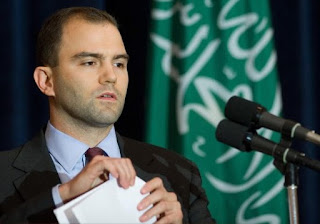My article from the May 10, 2013 issue of
Front Page Magazine:
What Did Obama Know and When Did He Know It?
By Matthew Vadum
Congressional testimony this week showed the appalling lengths to which the Obama administration went to cover-up its mishandling of last fall’s terrorist attack at the U.S. mission in Benghazi, Libya, but President Obama’s precise role in the cynical operation remains hidden.
Americans still don’t know what President Obama knew and when he knew it. We don’t know what exactly he did when he learned on Sept. 11, 2012 that U.S. officials in Benghazi were under attack. Obama may have gone to bed while the attack was in progress, leaving others in the administration to develop a politically expedient cover story calculated to get the Obama administration past the finish line last Election Day.
Obama’s advisers, with the president’s consent or not, opted to tell lies to get their man reelected, and to deal with the consequences of those untruths later. They knew they could count on the mainstream media to snooze on the job and dismiss the investigation to come as a partisan witch-hunt.
The manufactured storyline emphasized Obama’s increasingly hollow claim that “al-Qaeda is on the path to defeat and Osama bin Laden is dead.” It allowed the president to escape much needed scrutiny about his lame approach to national security and the threat that Islamism poses to the United States.
Although three State Department whistleblowers testified Wednesday before the House Oversight and Government Reform Committee, the testimony of one witness in particular was especially unfavorable to the Obama administration.
During the hearing, star witness Gregory N. Hicks, deputy chief of mission at the U.S. Embassy in Libya during the attacks,
explained to Rep. Jason Chaffetz (R-Utah) that U.S. military personnel were not allowed to come to the aid of U.S. officials in Benghazi, a mere 400 nautical miles away.
“They remained in Tripoli with us,” Hicks said. “The medic went with the nurse to the hospital and his skills to the treatment of and care of our wounded.”
Chaffetz asked how the personnel reacted to being ordered to stand down.
“They were furious,” Hicks answered. “I can only say, well, I will quote [Army] Lieutenant Colonel [Steve] Gibson — he said ‘this is the first time in my career that a diplomat has more balls than somebody in the military.’”





